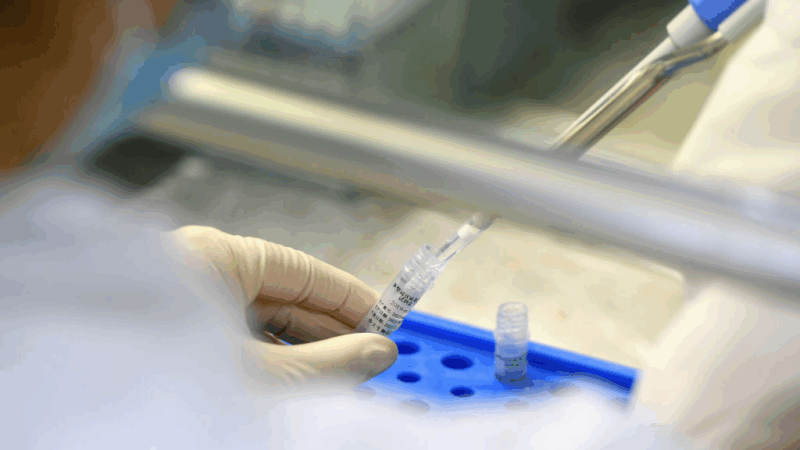Trump restricts funding for ‘gain-of-function’ research — calling it dangerous
President Trump issued an executive order Monday restricting federal funding for research that involves a controversial field of scientific study known as “gain-of-function” research.
The research, which is also known as “dual-use” research, involves experimenting with viruses and other pathogens that have the potential to trigger a pandemic. Those studies could discover how infectious agents might become more transmissible or make people sicker.
This field has long been controversial because of fears that scientists could make a more dangerous pathogen in their lab that could get out and cause a pandemic. Those concerns have led to many efforts over the years to more tightly monitor and control this research.
But gain-of-function research became especially controversial and politically polarized during the COVID-19 pandemic. One theory for how the pandemic started says that the SARS-CoV2 virus, which causes COVID-19, spilled out of a Chinese government laboratory in Wuhan, China.
“Many people believe that gain-of-function research was one of the key causes of the COVID pandemic that struck us in the last decade,” said White House secretary Will Scharf. “What this executive order does first of all, it provides powerful new tools to enforce the ban on federal funding for gain-of-function research abroad. It also strengthens other oversight mechanisms related to that issue and creates an overarching strategy to ensure that biomedical research in general is being conducted safely.”
Many scientists refute that theory, arguing that the weight of the evidence suggests the pandemic started when someone in China was infected by a wild animal carrying the virus.
That said, many scientists also agree that better oversight is needed because of the possible risks. But many worry a moratorium would be too broad and could stifle safe research and that is necessary to prevent or respond to the next pandemic.
“If we ban it, the next time another COVID virus comes through we won’t have the data to quickly find new treatments, screening and even preventative measures,” says Kristin Matthews, a fellow in science and technology policy at Rice University’s Baker Institute for Public Policy.
But others want funding restricted.
“If one of these pathogens is released accidentally or if they are released deliberately, they can cause pandemics,” said Richard Ebright, a microbiologist at Rutgers University who subscribes to the so-called “lab-leak” theory to explain how the pandemic originated.
According to the White House, the executive order would block any U.S. funding of gain-of-function research in “countries of concern,” such as China and Iran, as well as other foreign nations “deemed to have insufficient research oversight.” The order also prohibits U.S. dollars from “contributing to foreign research likely to cause another pandemic.”
The order also “empowers American research agencies to identify and end federal funding of other biological research that could pose a threat to American public health, public safety, or national security,” according to a White House fact sheet.
The order will “increase the safety and security of biological research without impeding U.S. innovation,” the White House says.
The White House also issued statements from several Trump administration officials who argued the funding restriction is necessary.
“I commend President Trump for his courage and his vision,” said Health and Human Services Secretary Robert F. Kennedy Jr.
“This is a historic day,” said Dr. Jay Bhattacharya, the director of the National Institutes of Health. “The conduct of this research does not protect us against pandemics, as some people might say, it doesn’t protect us against other nations. There’s always a danger that in doing this research, it might leak out, just by accident even, and cause a pandemic.”
“It’s crazy to think that this entire nightmare was probably the result of some scientists messing with mother nature in a laboratory with technology,” said Dr. Marty Makary, the Food and Drug Administration commissioner.
House Dem. Leader Jeffries responds to air strikes on Iran by U.S. and Israel
NPR's Emily Kwong speaks to House Minority Leader Hakeem Jeffries (D-NY), who is still calling for a vote on a war powers resolution following a wave of U.S.- and Israel-led airstrikes on Iran.
Iran’s Ayatollah Ali Khamenei is killed in Israeli strike, ending 36-year iron rule
Khamenei, the Islamic Republic's second supreme leader, has been killed. He had held power since 1989, guiding Iran through difficult times — and overseeing the violent suppression of dissent.
Found: The 19th century silent film that first captured a robot attack
A newly rediscovered 1897 short by famed French filmmaker Georges Méliès is being hailed as the first-ever depiction of a robot in cinema.
‘One year of failure.’ The Lancet slams RFK Jr.’s first year as health chief
In a scathing review, the top US medical journal's editorial board warned that the "destruction that Kennedy has wrought in 1 in office might take generations to repair."
Here’s how world leaders are reacting to the US-Israel strikes on Iran
Several leaders voiced support for the operation – but most, including those who stopped short of condemning it, called for restraint moving forward.
How could the U.S. strikes in Iran affect the world’s oil supply?
Despite sanctions, Iran is one of the world's major oil producers, with much of its crude exported to China.




